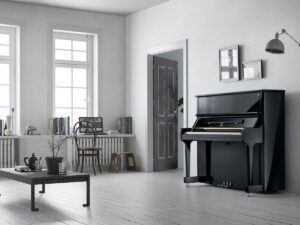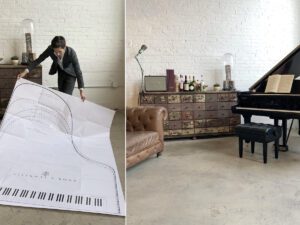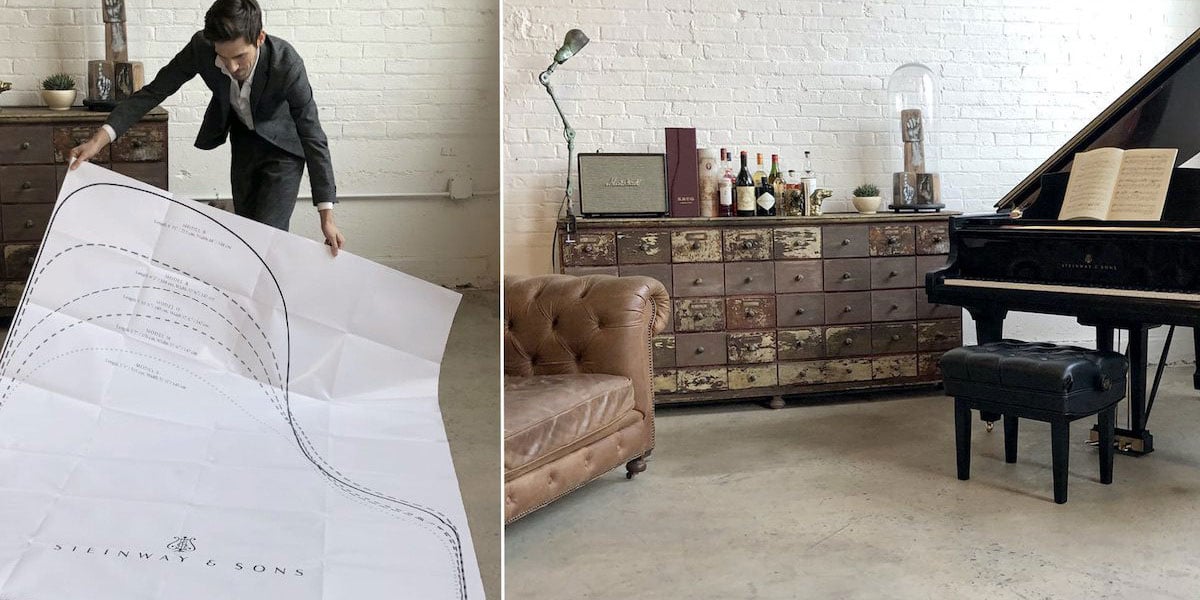Does piano placement in the home really matter?
March 14, 2022 •Stephen Reed
Updated January 2023.
Buying a piano is an investment–an investment in the musical quality of the instrument, which, in turn, is protected by thoughtfully caring for the instrument and the high-quality materials used to make it. As strong as the woods are in a grand or upright, they are still susceptible to the elements, like high humidity in coastal regions like Boston.
As a result, determining the best place in your home for your new piano is an important consideration. After all, what could be worse than investing thousands of dollars in a beautiful instrument with exceptional musical value, only to see that value diminished more quickly than necessary over time?
At M. Steinert & Sons, we have been helping our customers not only buy the best piano for them but also always consider how they will be happy after any purchase. That includes thinking about things like the best placement for their new piano in the home or institution.
Piano placement is an important decision, perhaps an even more critical decision than regular maintenance. Why? Because once a piano is placed, it often remains in that position for years.
All the more reason to make that placement a good one.
By the end of this article, you will know where the best potential places are for piano placement, understanding why some places are best while others are not. You’ll also understand how piano placement affects the mechanical, structural, and aesthetic dimensions of your piano, even its longevity.
Where you should NOT place a piano in your home
Understandably, your piano placement may be constrained by the space and structures in your home or institution. Having said that, there are some areas to avoid placing your piano.
Not near a poorly insulated window
While having a piano by a window may seem a pleasant placement, this may be one of the worst possible places for the overall well-being of a piano, whether a grand or an upright. The air around windows change with the conditions outside, both on a daily and seasonal basis.
Temperature and humidity rise and fall, and a piano placed near a window experiences all of those atmospheric changes. This causes your piano’s wooden action parts to shrink and swell. Additionally, your piano’s tuning will be affected, causing your piano to need tuning more often.
Not close to air vents
Another place to avoid for atmospheric temperature issues is an air vent. Obviously, in this case, the atmosphere affecting your instrument is from inside your home, not outside.
Whether with air vents or other areas affecting the interior environment (e.g. fireplaces, heaters, air conditioners), your piano will not respond well to a frequently changing environment. The fewer changes in temperature and less airflow, the better.
Think “climate-controlled” for your piano’s space.
Not around direct, extended sunlight
Whether near a window or skylight, you risk more harm than you may suspect from allowing direct sunlight to hit it even a little while each day. Even that much sunlight, day after day, month after month can cause your piano’s beautiful finish to fade.
Wood finishes are particularly susceptible to fading in sunlight.
Where should you place your piano in your home?

Proper placement safeguards your piano’s structural, mechanical, and aesthetic condition. One major advantage is to put the piano in the best place in an insulated room. Having good piano placement results in your piano having its best possible performance, sound, and longevity.
According to Total Piano Care, a home or building’s inner walls and climate-controlled conditions are paramount when considering piano placement. Grand pianos, when placed in a room are better secured and sound better when their straight edge is against an inner wall, distanced from sunlight, air vents, or windows. Uprights should be similarly placed.
Ideally, grand pianos should be placed in such a way as to allow the pianist to look into the room and not into a wall. The bass side of the piano should run parallel to the wall. This allows the bass to bounce against the wall to the wider room and the treble to project into the middle of the room.
If necessary, a grand piano can also be placed at a 45-degree angle towards a diagonal corner.
Are there exceptions to the inner wall piano placement recommendation?
A few exceptions to the inner wall placement are possible for adequate piano placement. For example, the middle of the room can be used if exceptional acoustics are possible with high ceilings and hardwood floors, or materials that aid in sound amplification and continuation are in place.
Again, wherever the specific piano placement is, the main concern is airflow and atmospheric changes near the piano. This safeguards your investment and its musical quality from unnecessary deterioration and tuning instability.
A bit of good news: Mature piano brands like the Steinway Family brands, Yamaha, and Kawai are more resilient to environmental changes due to their careful materials selection, expertise, and experience via warranty claims over the years.
Request a floor pattern to help with your piano placement

Homes are not always built with pianos in mind. As a result, a few inches may make the difference between placing your piano in your favorite room or another.
At M. Steinert & Company we know that it’s difficult to fully think about placing a piano until you have it in your home. That’s why we created piano templates that our piano consultants can bring to your home, if you’re in the greater Boston area, to ascertain the best piano placement and size.
Learn more in the articles below. Read how about floor patterns and how to determine what size piano will fit in your space. You’ll soon see why floor patterns can be so helpful.
Make an appointment to talk with one of our piano consultants at our Newton location. They can assist you as you decide on the right piano–and right piano placement–for you.
Featured Articles
Categories
- Beginner Pianos (17)
- Boston Pianos (12)
- Comparisons (26)
- Designer and Specialty Pianos (8)
- Essex Pianos (10)
- Events (11)
- Featured (22)
- Institutional (3)
- Joy of Piano (14)
- Learning About Pianos (62)
- News (34)
- Pricing and Cost (19)
- Resource Center (117)
- Roland Pianos (6)
- Spirio (14)
- Steinway Pianos (67)
- Student (14)
- Teacher (12)
- Used Pianos (20)
- Videos (17)


